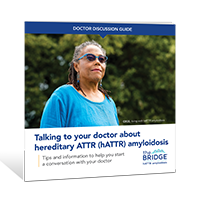Start the hATTR amyloidosis conversation with your doctor
If you suspect you might be at risk for hereditary ATTR (hATTR) amyloidosis, it’s important that you talk to your doctor. Here are some tips to prepare for the conversation:
Find out about your family history
Gathering your family’s healthcare records and compiling your family’s medical history can give your doctor important information that can help with the diagnosis of hATTR amyloidosis.
Download the Family Health Tree tool to help you keep track of your family history and make it easier to discuss with your doctor.
Prepare a list of symptoms
Symptoms of hATTR amyloidosis can affect many parts of the body and can often be mistaken for other conditions, so it’s important to be aware of the various symptoms that may be a sign of hATTR amyloidosis.
Keep track of your symptoms using the Symptoms Checklist & Tracker tool and discuss them with your doctor during your next visit.
It’s important that you discuss all your symptoms because your doctor may choose to refer you to a specialist who could recommend further tests to help make a diagnosis.
“Working with my
healthcare team helped me determine the best next steps.”
Genetic counseling and testing
If your doctor believes you are at risk for hATTR amyloidosis, they may recommend you work with a genetic counselor.
Download the Genetic Counseling & Testing Guide to get an overview of the genetic testing process for hATTR amyloidosis, and how it may impact you and your family.
Why is it important?
Genetic counselors can help you and your family understand your chances of developing the condition as well as familiarize you with the testing process and implications of a diagnosis. Genetic counselors can also help you understand the issues related to genetic testing—from personal risk to possible insurance impact—and can help you determine if a genetic test may be right for you.
What information does it provide?
A genetic test can tell you if you carry a variant in the transthyretin (TTR) gene associated with hATTR amyloidosis. If a gene variant is identified, family members of an affected individual can use this information to help determine their own risk.


